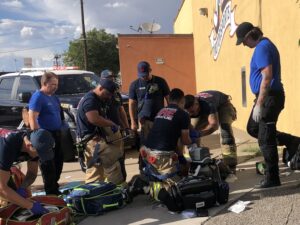10:28
News Story
Death rates for people under 40 have skyrocketed. Blame fentanyl
Accidental overdoses are now the No. 1 cause of death for young people in 37 states, including Missouri
A new Stateline analysis shows that U.S. residents under 40 were relatively unscathed by COVID-19 in the pandemic but fell victim to another killer: accidental drug overdose deaths.
Death rates in the age group were up by nearly a third in 2021 over 2018, and last year were still 21% higher.
COVID-19 was a small part of the increase, causing about 23,000 deaths total between 2018 and 2022 in the age group, which includes the millennial generation (born starting in the early 1980s), Generation Z (born starting in the late ’90s) and children. Vehicle accidents and suicide (about 96,000 each) and gun homicide (about 65,000) all took a cumulative toll from 2018 to 2022, according to a Stateline analysis of federal Centers for Disease Control and Prevention data.
Overdose deaths, however, took almost 177,000 lives in that time.
Accidental overdose became the No. 1 cause of death in 13 states for people under 40, overtaking suicide in nine states and vehicle accidents in five others; it’s now the top cause in 37 states. The only other change was in Mississippi, where homicide became the main cause of death, overtaking car accidents. In 40 states and the District of Columbia, overdose was the biggest increase in deaths for young people.
States are responding to the skyrocketing death rates with “harm reduction” strategies that can include warning of the new danger of recreational drugs laced with deadly fentanyl, training and equipping people to counteract overdoses when they see them, and even considering controversial supervised drug use sites to keep addicts safer.
A “fourth great wave” of accidental overdose deaths driven by drugs spiked with powerful fentanyl is now washing over young America, said Daliah Heller, vice president of drug use initiatives at Vital Strategies, an international advocacy group that works on strengthening public health.
Prescription opioids led to one surge in drug dependency from 2000 to 2016, then when supply waned in response to crackdowns, users turned to heroin, synthetic opioids and finally fentanyl, which is 50 times more potent than heroin and easier to get in the pandemic, Heller said.
‘Very common’ experience
Jonathan Diehl of Silver Spring, Maryland, died in 2019 at age 28 after using heroin he likely did not know was spiked with fentanyl, said his mother, Cristina Rabadán-Diehl. Jonathan Diehl earned a degree in construction management and was starting a promising new job in home heating and air conditioning four days before he died, his mother said.
“I think Jonathan’s trajectory was very common,” said Rabadán-Diehl, who now works as an adviser on substance use disorders. “He started with opioid pills, and when the government started putting restrictions on prescriptions, he as well as millions and millions of Americans transitioned into the illegal market. And then fentanyl made its appearance.”
Now, a fresh wave of overdose deaths — different from the first three — is fed by fentanyl making its way into all kind of recreational drugs, and by pandemic isolation that led to more solitary drug use, Heller said.
“Somebody might think they’re getting a Xanax [for anxiety], or methamphetamine or cocaine,” Heller said. “They have no experience with opioids, it’s not what they’re expecting and now they have a much higher risk of overdose and death.”
Authorities generally classify overdose deaths as an accident or suicide based on individual investigations of the circumstances surrounding each death.
States struggling the most with deaths of young people, driven mostly by accidental overdoses, include New Mexico, which eclipsed West Virginia and Mississippi since 2018 to have the highest death rate in the nation for people under 40 — about 188 deaths per 100,000, up 43% since 2018.
Other states with high death rates for the age group include West Virginia (170 deaths per 100,000), Louisiana and Mississippi (164), and Alaska (163).
In New Mexico, where accidental overdoses became the main cause of death for people under 40 in 2022, overtaking suicide and rising 90% to 394 deaths since 2018, the overdose problem has generally been concentrated in poverty-plagued rural areas such as Rio Arriba County on the Colorado border.
Democratic state Rep. Tara Lujan, who has relatives in that county, sponsored harm reduction legislation signed into law last year. It is similar to laws in many other states that include wide distribution of naloxone to reverse overdoses, legalized testing equipment for deadly additives like fentanyl, and good Samaritan laws that allow friends to report overdoses without legal consequences for their own drug use.
Lujan hopes to reintroduce a bill that would create so-called overdose prevention centers or harm reduction centers where drugs can be used in a supervised and safe environment. The legislation died in committee this year after Republicans called the idea “state-sponsored drug dens.”
“It’s all issues that were in place before the pandemic, but the pandemic made everything completely off the rails,” Lujan said. “My committee meetings have been packed with family members saying, ‘We know they won’t quit on their own, but we don’t want them to die.’”
Only New York City has two such facilities in operation, run by advocates; the sites claim some success in reversing overdoses. But federal law enforcement authorities are threatening to shut them down without a specific state mandate, since otherwise they fall under a federal law banning operations that allow illegal drug use on-site.
In California, Democratic Gov. Gavin Newsom last year vetoed legislation that would have allowed jurisdictions to open safe injection sites, saying they “could induce a world of unintended consequences” in cities such as Los Angeles, San Francisco and Oakland.
“Worsening drug consumption challenges in these areas is not a risk we can take,” Newsom wrote in a veto message.
Rhode Island is the only state so far to pass legislation allowing supervised drug-use sites as a pilot project, in 2021, but has yet to open any centers. New legislation introduced this year would push the expiration of the pilot project from 2024 to 2026.
Bills on the same topic of supervised drug-use sites were under consideration this year in Colorado, Illinois and New York but did not pass.
In a sign of the impact on young people, a Massachusetts bill would have required all state university dorm assistants to have naloxone training to reverse overdoses, but it stalled.
New Hampshire is one of several states experimenting with vans that go to known drug-use locations and offer overdose prevention supplies and advice.
Death rate disparities
The lowest death rates for young people in 2022 were in Hawaii (78), Massachusetts and Rhode Island (79), and Utah and New Jersey (80). Massachusetts and New Jersey were the only states to see decreases in overall deaths for people under 40 since 2018, and also had drops in overdose deaths, although overdose remained the No. 1 cause of death for young people in both states.
Nationally, accidental overdoses dominated the increase in deaths in residents under 40 across racial and urban-rural divides, but many disparities exist. The increase in young overdose death rates was 154% for Black Americans, 122% for Hispanic residents and 37% for white people, yet even for white residents they represented the largest increase.
The largest urban areas saw increases in overdose death rates of 70%, and rural areas 64% — the largest increases in both areas for any cause of death.
Across races and age groups overdose death rates are higher for men and slowed in 2017, but picked up again after 2018 and skyrocketed in the pandemic until 2021, according to a federal National Center for Health Statistics data brief published last year.
Stateline is part of States Newsroom, a nonprofit news network supported by grants and a coalition of donors as a 501c(3) public charity. Stateline maintains editorial independence. Contact Editor Scott S. Greenberger for questions: [email protected]. Follow Stateline on Facebook and Twitter.
Our stories may be republished online or in print under Creative Commons license CC BY-NC-ND 4.0. We ask that you edit only for style or to shorten, provide proper attribution and link to our website. AP and Getty images may not be republished. Please see our republishing guidelines for use of any other photos and graphics.





